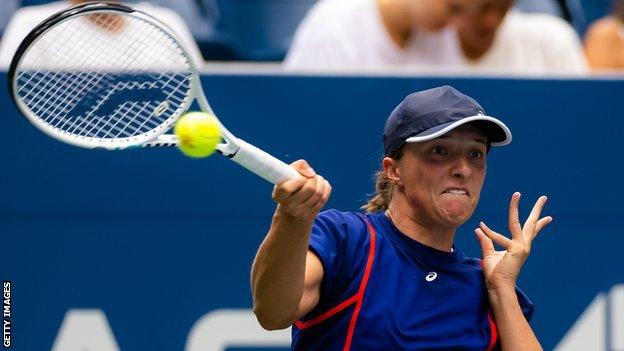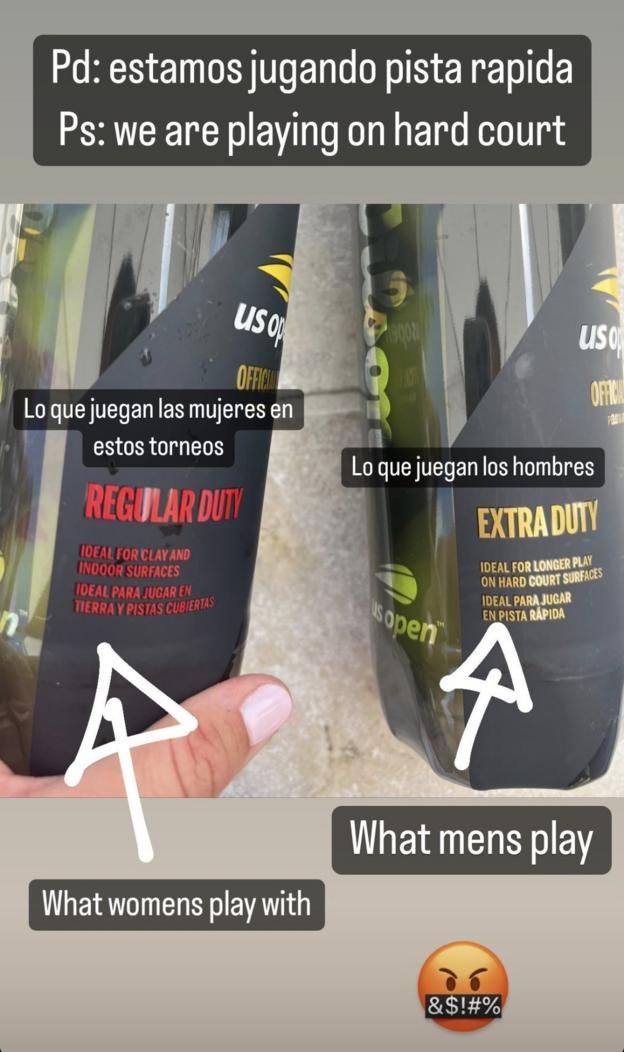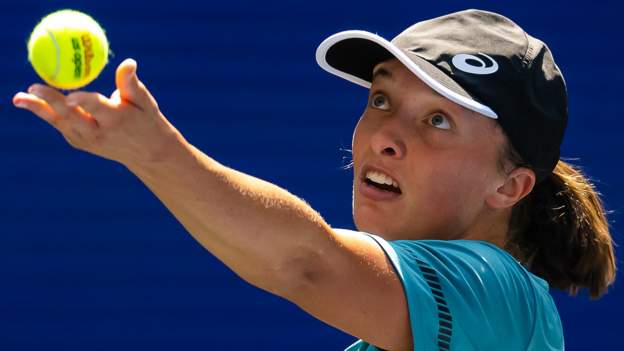New balls please? Women players criticise US Open balls

| Venue: Flushing Meadows, New York Dates: 29 August-11 September |
| Coverage: Daily radio commentaries across BBC Sounds and the BBC Sport website and app, with selected live text commentaries and match reports on the website and app |
When world number one Iga Swiatek was asked about the tennis balls the female players use at the US Open, she did not hold back.
“I think those balls are horrible,” Swiatek said last week.
“They are pretty bad. I know there are many players who complain, and many of them are top 10.”
The US Open is the only major where men and women use different balls and, in the build-up to this year’s tournament, a number of players have echoed Swiatek’s comments.
There has also been a mixed response to the decision to allow in-play coaching at the tournament for the first time.
What difference do the balls make?
The women use Wilson US Open regular duty balls in New York, while the men use Wilson US Open extra duty balls.
The regular duty balls are thinner and lighter than the extra duty ones. Wilson states that the regular balls are likely to fluff up more, meaning they play faster but are “less durable” than the extra duty.
Wilson also says that the regular duty balls are developed for softer surfaces, like clay or indoor courts, compared to the extra duty ones, which are for hard courts and “abrasive” surfaces.
Swiatek explained that the lighter balls can contribute to more unforced errors which, in turn, can make matches more unappealing to watch.
“Especially after three games of really hard playing, they are getting more and more light,” she said at the Cincinnati Open last week.
“At the end, you can’t even serve at 170kmh [105mph] because you know it’s going to fly like crazy. They are pretty bad.
“Right now we play powerful, and we kind of can’t loosen up our hands with these balls. We make more mistakes, for sure, so I don’t think that’s really nice to watch visually.”
The US Tennis Association said “a number of factors” are considered in deciding which balls to use.
“The USTA works closely with the WTA and ATP Tour, their player councils and our brand partner on an annual basis to determine what type of balls they recommend,” a USTA spokesperson said.
“The USTA will continue to follow the recommendations of the tours and their player councils to determine which balls are utilised during the US Open.”
What have other players said?
Fourth seed Paula Badosa of Spain posted a photo on Instagram from one of her practice sessions comparing the two balls.

Daniel Vallverdu, who coaches former men’s champion Stan Wawrinka, replied to the image on Twitter, writing: “The game has evolved. Should be the same extra duty ball for men and women. She is 100% right in my opinion.”
French Open runner-up Coco Gauff said she could “definitely tell there’s a difference” when it came to using the US Open balls.
Meanwhile, American number one Jessica Pegula, who is part of the Women’s Tennis Association’s player council, said she was “personally not a huge fan” of the balls. She told The Guardian: “I feel like the first couple weeks there are a lot of double faults, because the balls are just kind of flying a bit more. I don’t see why we couldn’t switch to extra duty. But it’s easier said than done, so hopefully the player council can work on that.”
However, players such as Petra Kvitova and Madison Keys, who tend to hit hard, flat strikes that will gather more pace off a lighter ball, have said they like the regular duty ones.
Wimbledon runner-up Ons Jabeur, known for her crafty ball striking, said she will “play with any ball” but added: “It would make sense if we played with the same balls as men, because that’s what we do in other Grand Slams. I see their point.”
WTA spokeswoman Amy Binder told the Associated Press: “The basis behind using the regular felt ball was that it limited the potential of arm, shoulder, elbow and wrist injuries.
“This is something that we will continue to monitor and discuss further with both our athletes and our sports science teams.”
What about the coaching changes?
Players will be able to receive verbal and non-verbal coaching from the stands during the tournament, provided it does not interrupt play or hinder an opponent.
Although it is against the rules at most tournaments, coaching from the sidelines is common, with players given warnings or point penalties if they are caught out.
The father of Greece’s Stefanos Tsitsipas has often been caught trying to coach his son, most notably at this year’s Australian Open, where an umpire was stationed underneath his box to catch any comments.
“My coach has not been as discreet as other coaches, but it has been always happening,” Tsitsipas said.
“I’ve gotten a lot of coaching violations, which I found unfair. But now that it’s legalised, I’m more than happy I won’t have to deal with referees that are so strict and want to kind of ruin the game.”
However, world number 12 Taylor Fritz said he “hates” the new coaching rule.
“Tennis is an individual sport, so why should someone else be able to help you?” the American said.
“I think people underestimate how mental and strategic the sport is, so they don’t understand how big of a difference it is.
“I think that figuring it out for yourself on the court is a massive part of our sport. I just feel like we’re losing an important part of tennis.”
Swiatek said she could understand both sides of the argument.
“I understand that players say that it’s an individual sport but on the other hand basically there’s coaching in most of sports,” the Pole added.
“In football coaches can shout, even though there’s 11 grown men on the field and they should know what to do. They probably know the tactics, but he’s still talking.”


For all the latest world News Click Here

